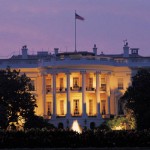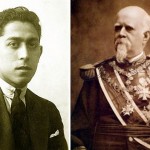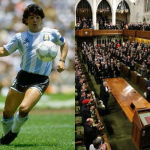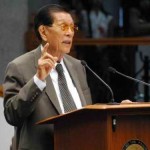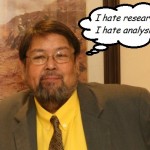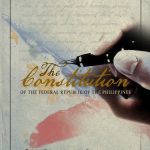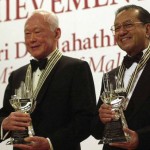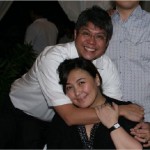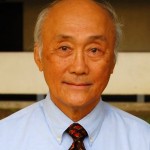Get Real Philippines has been deteriorating in the quality of its articles recently (actually, that started when Benign0, Ilda, and Ben Kritz essentially shooed away GRP’s solutions-oriented faction), and this once again became obvious when Benign0 revealed that he has an extremely weak understanding of business, money, and economics.
In a recent article, the Get Real Philippines webmaster said:
“The BIG assumption underpinning all this “debate” is that more money will necessarily spell a better future for Filipinos. We assume that money in the hands of Filipinos will be well-spent. Has anyone ever questioned this BIG assumption? Seeing it from that perspective, the issue of whether said money comes from overseas or from within simply becomes a non-issue and brings to light the question of how sound this assumption is.”
In another cluelessly-written article, Benign0 said:
“The basics of living within one’s means now simply fly over the heads of our lot who are slowly starving as the intravenous feed of foreign capital (in the form of both FDI and OFW remittances) either slows to a trickle or is engulfed by our galloping mall-hungry population.”
Doesn’t Benign0 understand how FDI works?
First off: FDI (Foreign Direct Investments) will not be in the hands of Filipinos per se. They will be in the hands of the Foreign Direct Investor (ie: the Multinational Company (aka “MNC”) who comes into the country to invest in a business) who will be guided by the HQ’s directives in the original country of origin of that company and most likely be headed by an expatriate foreign manager who will be making the decisions on how that foreign money will be spent.
Secondly, FDI will, by its very nature, tend to go towards productive use: Capital expenditure such as equipment, and even training of employees, wages, and other expenditures that aim towards creating value (and hopefully, producing profit).
Multinational Companies use their money (the FDI) in exchange of goods and services they need to get certain things done. They pay money to get something tangible in return. MNC’s thus do not just give “free money” away.
In short, an MNC offers to pay the money to its prospective suppliers, presumably local Filipino businesses that it deals with, so that they must come up with goods or services that are up to specification and meet certain standards, and those that do not meet those specifications simply don’t win the bidding war. Those that do get chosen and provide goods and services that the MNC customer needs are likely to continue getting repeat business. Those who do get chosen but fail to live up to expectations do not get repeat business.
The same goes with hiring employees. The MNC will hire people to do jobs it needs to get done, and those people who do their jobs properly get rewarded with higher pay and promotions, while those who do not simply get fired.
It’s that simple. No free lunch. No free money. Money is exchanged in a fair trade where money is exchanged for necessary goods or services.
Doesn’t Benign0 understand this concept?
* * *
Let’s not forget that Benign0 is supposed to be some kind of “Business Consultant”, for he – together with a similarly misinformed guy named Benjamin Kritz – formed Get Real Business Online as a kind of “Business Consulting” blog which assumes that these two are supposed to understand how business, economics, and money all work.
(You can see “Benign0” and Ben Kritz in action over at the comments section of one article in the GR Business Online site, and see their brand of “consulting” at work.)
Looks like Benign0 is not such a “good consultant” after all. I mean, if he doesn’t even understand that there is a clear difference between OFW Remittances versus FDI’s, then he really shouldn’t be talking about money, business, and economics at all.
* * *
To those who may not know the whole story, Benign0 was once upon a time this writer’s friend and colleague. Together with another person, 3 of us created the “Get Real Squad” which aimed to wake Filipinos up to understand that there were some serious problems in the Philippines and in Filipino Culture that needed rectification. That group grew in number, with Ben Kritz joining in 2007 and a huge bunch of others joining in 2009.
While Benign0 wrote a lot of articles that essentially talked about the weaknesses inherent in the Philippines and pointed to Filipino Culture as one of its major (if not the major) causes, yours truly acknowledged those same things that Benign0 brought up but also sought to provide practical solutions that would in fact ameliorate the problems found in Philippine Society and simultaneously allow Filipino Culture to improve. One of those solutions was Constitutional Reform.
I argued that the Economic Liberalization aspect of Constitutional Reform (aka “Agenda number 1 of the CoRRECT™ Three Point Agenda”) would help solve the most glaring (but highly under-appreciated) problem of the Philippines today: Massive Unemployment and Underemployment. This reform initiative would entail getting rid of the anti-Foreign Investment provisions of the 1987 Constitution and thus allow Multinational Companies and Foreign Direct Investors to more freely come into the Philippines and create jobs for locally-based Filipinos.
I used the example of Singapore and many other countries in ASEAN whose efforts at fighting poverty and unemployment were all based on getting rid of restrictions against FDI and this immediately translated into higher FDI in-flows and eventually greater job-creation and real and sustainable GDP growth.
But Benign0 suddenly went out to attack that very solution I had suggested. His reason? He insinuates that Filipinos are not ready for the entry of FDI and that Filipinos must first “improve their culture” before FDI is allowed to come in.
(Did other countries in ASEAN even do that whole “everyone needs to change their culture before FDI’s come in” bit? Malaysia certainly didn’t. Indonesia didn’t. Singapore didn’t. Vietnam didn’t. Outside of ASEAN, China and India didn’t. In fact, it was the entry of FDI that changed their cultures to become more competitive!)
Apparently, he doesn’t understand how FDI works as seen in his inability to understand the difference between FDI and OFW Remittances. Worse, despite Benign0 touting himself as some kind of “Filipinos must improve their culture”-warrior, Benign0 has proven to be totally deficient when it comes to understanding what “culture change” requires.
See, it’s easy to tell Filipinos that they need to “improve their culture.” It’s easy to tell Filipinos that they’re “too spendthrift” and that “Filipinos need to learn to live within their means” or that “Filipinos need to learn how to handle money.” Those are the whining rants that have repeatedly come out of Benign0 ever since he decided to launch attacks on my attempts to complement his rants with my solution-proposals.
But Benign0 has never mentioned anything about how those culture changes he says must happen are supposed to happen. He thinks that blogging about it and simply telling Filipinos that “Filipinos are lousy at business” or “lousy at managing money” will cause Filipinos to improve their business acumen or learn to manage money better.
Benign0 seems to have forgotten that very often, the cultural inclinations of people are actually the end result of how their environment or their “eco-system” forces or induces them to act.
When jobs are extremely scarce due to the dearth of investors (local and/or foreign), people tend to lose hope and a kind of “learned helplessness” sets in. Many of these people end up becoming slackers and bums, and a weird culture of dependency on others develops. Oftentimes, the lack of opportunities causes them to make use of an obvious “excuse” or “justification” for why they are jobless because a scarcity of help-wanted ads means they can easily point to the bad job market as the reason for why they’re just slacking off.
Benign0 does not understand that if jobs suddenly became plentiful as a result of a massive increase in FDI inflows resulting from the removal of FDI-restrictions, a lot of the people who are currently slackers and bums would suddenly lose that justification. Everyone will be talking about job openings left and right. The friends of the bums and slackers will be talking about going for job interviews and comparing job offers. Those same friends will be talking about the things they can afford from the salaries they earn. The slackers who earn nothing will become envious and at some point decide to go and find work themselves. The families who support those bums and slackers (usually through OFW remittances or family wealth) will now start pressuring them to get a job. The excuse that “no one’s hiring” or that “there are no jobs” will no longer hold.
As it turns out, a new culture will emerge. Being a bum and slacker won’t be so cool anymore as back when FDI’s were few, it was “excusable” since there were no jobs. Now that there are lots of jobs created by the MNC’s and FDI-inflows, the old excuse won’t work. Internal and external means of motivating these slackers and bums to start the process of going for job interviews will occur as their own envy of their friends who are able to afford stuff will act as the internal pressure, while their own family’s repeated exhortations to “go find a job now that there are lots of job openings everywhere” acts as the external pressure.
More importantly, when jobs become abundant, more and more Filipinos will get hired, and as we all know, work ethic is learned through work. You do not develop work ethic unless you work. If you’re jobless, you can’t develop work ethic. But if you get yourself a job, you will have to perform at your job because if you don’t, you can get fired. That’s how most people develop work ethic: Work.
Another thing: Most people only start developing money management skills once they start earning their own money.
If people are jobless and thus do not earn their own money, then quite obviously, they can’t learn to handle money properly. The only way for people to learn to save is for them to first earn money.
One of Benign0‘s pet peeves was that “Filipinos don’t invest.” But wait… Here are a few things he didn’t think about:
You can’t invest what you haven’t saved.
You can’t save what you haven’t earned.
And you can’t earn a salary if you don’t have a job!
And that’s where we get to the whole chicken-and-the-egg question of what exactly is the economic problem of the Philippines. Is it the problem of massive poverty that is the result of massive unemployment/underemployment that in turn results from the lack of investors creating jobs thanks to all those anti-FDI restrictions in the Constitution and the laws that are based upon it? Or is it the “Culture of Filipinos” of having lousy money-management skills?
Well, we all know that many other societies in the Southeast Asian region have very similar cultures to Filipino Culture. Malays and Bumiputras of Malaysia. The Pribumis of Indonesia. Even many non-Malayo Polynesian cultures such as the Thais, Cambodians, Laotians, Burmese, and Vietnamese have cultural similarities with Filipinos. Those among them who have relied heavily on FDI to develop their economies (Malaysia, Indonesia, Cambodia, Thailand, and Vietnam) have succeeded where they originally didn’t even have any of the investment savvy that Filipinos had over everyone else in the region back in the 50’s, 60’s, and 70’s.
(Let’s not forget: The Philippines continues to have the English advantage over many of the other countries in the ASEAN region. MNC’s from the West are much more inclined to want to invest in the Philippines if only to hire Filipinos, except that the restrictions against FDI in the Philippines shoo them away.)
Indonesia, for instance, is the most Philippines-like among all the rising stars in the region in terms of the people’s culture, and thus suffers from the same cultural flaws that Filipinos are described by Benign0 to suffer from. Indeed, I do not deny that these cultural inclinations of Filipinos are problems. But CETERIS PARIBUS, at least having FDI more easily flow in means greater job creation and greater job creation means more people learning how to handle their own money and eventually learn how to invest their money.
As you all know, Benign0‘s premise about not wanting the Philippines to rely on FDI is based on his idea that the Philippines should not be allowed to use FDI as a means of creating employment because he essentially says that Filipinos will “misuse” the money they earn.
That flawed premise is also based on his mistaken assumption that Filipinos must learn to become frugal and investment-savvy BEFORE Filipinos get employed by MNC’s coming into the Philippines. It’s flawed because Benign0 doesn’t realize that it is perfectly possible for Filipinos to learn to become frugal and investment-savvy WHILE they are employed by MNC’s. Who says that culture is static?
This is precisely the problem. Benign0 doesn’t know anything about culture or how culture develops.
His wrong assumption is that Filipinos are fixed in their ways and that Filipinos cannot learn about how to manage their money WHILE they are employed.
This is proof that Benign0 is unfortunately ill-equipped to be a “business consultant” and why his rants against Constitutional Reform, particularly against the initiative to remove the anti-FDI restrictions in the Constitution are a reflection on his lack of knowledge and his lack of real analytical ability.
* * *
About the Author
 Orion Pérez Dumdum comes from an IT background and analyzes systems the way they should be: logically and objectively.
Orion Pérez Dumdum comes from an IT background and analyzes systems the way they should be: logically and objectively.
Being an Overseas Filipino Worker himself, he has seen firsthand how the dearth of investment – both local and foreign – is the cause of the high unemployment and underemployment that exists in the Philippines as well as the low salaries earned by people who do have jobs.Being Cebuano (half-Cebuano, half-Tagalog), and having lived in Cebu, he is a staunch supporter of Federalism.
Having lived in progressive countries which use parliamentary systems, Orion has seen first hand the difference in the quality of discussions and debates of both systems, finding that while discussions in the Philippines are mostly filled with polemical sophistry often focused on trivial and petty concerns, discussions and debates in the Parliamentary-based countries he’s lived in have often focused on the most practical and most important points.
Orion first achieved fame as one of the most remembered and most impressive among the winners of the popular RPN-9 Quiz Show “Battle of the Brains”, and got a piece he wrote – “The Parable of the Mountain Bike” – featured in Bob Ong’s first bestselling compilation of essays “Bakit Baligtad Magbasa ng Libro ang mga Pilipino?”
Orion was originally one of the most senior members of Get Real Philippines’ “execom” group known as the Get Real Squad, and was Get Real Philippines’ official spokesperson as he was the most senior among the Philippines-based members during his 1 year hiatus in Manila. Unfortunately, Get Real Philippines webmaster and principal founder Benign0 got envious of the popularity of Orion’s numerous pro-Constitutional Reform articles. Benign0 also envied the fact that Orion had been invited to numerous speaking engagements, radio and TV appearances, and was mentioned several times in the newspaper column of Mrs. Carmen Pedrosa for his passionate dedication in pushing for Constitutional Reform. Without warning, Benign0 one day launched a barrage of friendly-fire attacks on Orion’s pro-Constitutional Reform advocacy, leading Orion to spin-off the Get Real Philippines Constitutional Reform information campaign advocacy into a separate entity which became the origins of the CoRRECT™ Movement. The envious Benign0 has not ceased launching attacks on Orion and the advocacy.
Orion is the principal co-founder of the CoRRECT™ Movement which aims to launch a massive information-dissemination campaign to inform the Filipino Public about the urgent need for Constitutional Reform & Rectification for Economic Competitiveness & Transformation.

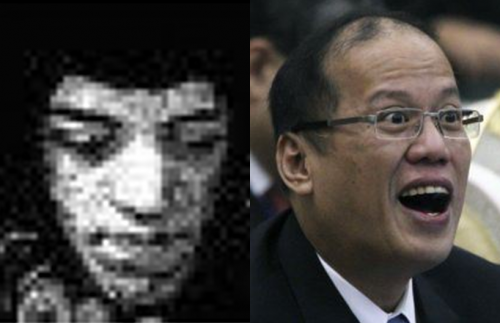
 I believe: This is a CoRRECT™ Video with a very positive message
I believe: This is a CoRRECT™ Video with a very positive message Walang Natira: Gloc-9's MTV Rap about the OFW Phenomenon
Walang Natira: Gloc-9's MTV Rap about the OFW Phenomenon
